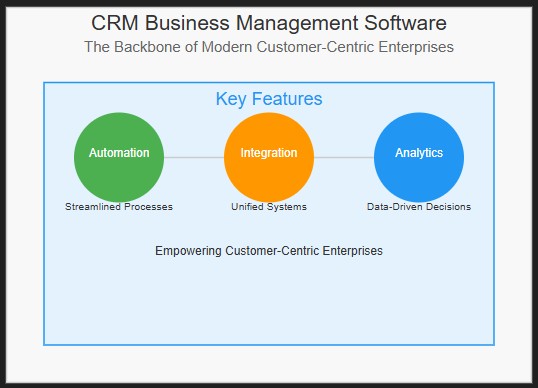In today’s ultra-competitive digital economy, businesses of all sizes must deliver personalized, responsive, and data-driven customer experiences. This growing complexity has led to the widespread adoption of CRM Business Management Software—an end-to-end tool that integrates customer relationships with daily business operations.
Table of Contents
Managing Business Through Customer Intelligence
No longer is CRM just about managing contact lists. The latest generation of CRM systems act as complete business management solutions, combining sales, marketing, customer support, automation, analytics, and even accounting functionalities. With real-time dashboards, AI-driven insights, and omnichannel communication capabilities, CRM software has become the central hub of business performance.
This article dissects what CRM business management software really is, its key features, top platforms, implementation strategies, and how it reshapes modern enterprise infrastructure.
1. What Is CRM Business Management Software?
CRM Business Management Software refers to a unified digital platform that helps businesses manage customer interactions and internal business processes across multiple departments. It connects sales, marketing, support, finance, inventory, and more into a single interface.
✅ CRM vs Business Management Software vs Combined Solution
| Category | Focus | Limitation |
|---|---|---|
| CRM Only | Customer lifecycle | Doesn’t handle operations |
| ERP Only | Operations & finance | Lacks deep customer engagement tools |
| CRM Business Management Software | Both customer + operations | All-in-one ecosystem |
Think of it as the command center where everything from lead nurturing to invoicing and customer support is tracked, managed, and optimized.
2. Why Businesses Need CRM Business Management Software
Here’s why this software category is mission-critical:
-
💡 Unified Data Source: One place for customer data, financials, sales metrics, and service tickets.
-
🚀 Increased Productivity: Teams spend less time switching tools and more time engaging customers.
-
🔐 Data Accuracy: Reduces duplicate entries and human error.
-
📈 Scalable Growth: From startups to enterprises, software scales with your user base and revenue streams.
-
📊 Real-Time Reporting: Live dashboards mean better and faster decisions.
3. Key Features of CRM Business Management Software
A top-tier CRM management system comes packed with features across multiple business functions:
a. Customer Relationship Management (Core)
-
Contact and account management
-
Interaction history and communication logs
-
Lead scoring and deal tracking
-
Customer segmentation and lifecycle mapping
b. Sales Pipeline Automation
-
Deal stages and workflows
-
Custom sales pipelines
-
Quote and invoice generation
-
Forecasting tools
c. Marketing Automation
-
Email campaigns and drip marketing
-
Social media integration
-
Website tracking & conversion metrics
-
A/B testing tools
d. Customer Support & Helpdesk
-
Ticketing system
-
Knowledge base management
-
Live chat and chatbot support
-
SLA tracking
e. Operations & Business Tools
-
Invoicing and billing
-
Inventory and product catalog
-
Task and project management
-
Time tracking
f. Analytics & Reports
-
Custom dashboards
-
KPIs by department
-
Sales and churn analysis
-
Customer lifetime value (CLV) metrics
4. Examples of CRM Business Management Software in 2025
Here are platforms that go beyond basic CRM and operate as full business management systems:
🔹 Zoho One
An all-in-one suite with over 45 integrated apps. Combines CRM, accounting, HR, and support.
🔹 Bitrix24
Offers CRM, project management, communication tools, and workflow automation in a single platform.
🔹 Odoo
Open-source ERP and CRM system that supports sales, marketing, accounting, inventory, and HR.
🔹 Salesforce + FinancialForce
Salesforce powers CRM while FinancialForce (built on top of Salesforce) adds accounting and ERP.
🔹 Nimble + Microsoft 365
Integrated into Office apps, Nimble helps small businesses manage customers, tasks, and sales.
5. Use Case Example: Small Business Adopts CRM Business Software
Business: A 15-person eCommerce brand selling organic cosmetics
Challenges: Manual invoicing, disorganized customer service, poor lead tracking
Solution: Implemented Zoho One
Outcome in 90 Days:
-
Lead conversion rate jumped by 40%
-
Support ticket response time reduced by 55%
-
All departments (marketing, sales, ops) using a single tool
-
Business processes automated, saving ~20 hours/week
6. Choosing the Right CRM Business Management Software
Here’s a checklist when evaluating platforms:
| Criteria | What to Look For |
|---|---|
| Scalability | Can it grow with your business? |
| Ease of Use | User-friendly interface for non-tech teams |
| Integration | Can it connect with tools like Gmail, Slack, Stripe, etc.? |
| Customization | Can workflows, fields, and reports be tailored? |
| Support | Access to live support, documentation, and a knowledge base |
| Pricing | Transparent pricing and affordable tiers |
💡 Don’t just choose the most popular software. Choose the one that fits your business process the best.
7. Benefits of CRM Business Management Software
📈 Operational Efficiency
Reduces the need for multiple tools and manual processes.
🔄 Automation of Repetitive Tasks
Email follow-ups, invoice generation, and lead nurturing workflows run automatically.
🎯 Enhanced Customer Engagement
Every team member—from sales to service—has access to customer history and insights.
🔒 Centralized Compliance & Security
All customer and financial data is securely stored in one location with proper access control.
8. Challenges in Implementation
Despite the benefits, CRM software implementations can fail without planning.
⚠️ Common Pitfalls:
-
Poor onboarding and training
-
Lack of team buy-in
-
Over-customization leading to complexity
-
Choosing the wrong system size
🛠️ Mitigation Tip: Start with a clear business requirement document (BRD) and train your team gradually.
9. Integration Capabilities with Other Tools
CRM Business Management Software typically offers:
-
Email Integration (Gmail, Outlook)
-
Accounting Sync (QuickBooks, Xero)
-
eCommerce Linkage (Shopify, WooCommerce)
-
Communication Tools (Slack, Zoom)
-
Marketing Platforms (Mailchimp, Meta Ads)
Most advanced systems offer open APIs or webhooks for custom integrations.
10. CRM Software & AI in 2025
AI has revolutionized CRM software:
-
🤖 Lead Scoring: AI predicts which leads will convert.
-
🧠 Email Suggestions: AI suggests optimal times and content for outreach.
-
📞 Call Transcripts: Auto-summarized and tagged calls.
-
📊 Predictive Analytics: Forecasts customer behavior and revenue trends.
Expect AI copilots and assistants embedded within CRMs to become the norm.
11. CRM Software for Different Business Sizes
✅ Small Businesses:
-
Tools: Zoho, Freshworks, Pipedrive
-
Needs: Affordability, ease-of-use, automation
🧩 Mid-Sized Companies:
-
Tools: Bitrix24, Insightly, Keap
-
Needs: Integration depth, workflow automation, analytics
🏢 Enterprises:
-
Tools: Salesforce, Microsoft Dynamics 365, Oracle NetSuite
-
Needs: Customization, scalability, compliance, advanced analytics
12. The Future of CRM Business Management Software
🔮 Trends to Watch:
-
CRM + ERP Convergence: Expect platforms that unify front and back office.
-
AI-First Interfaces: CRMs that recommend next steps.
-
Low-Code CRM Customization: Drag-and-drop builders for workflows and automations.
-
Voice-Enabled CRM: Voice assistants will update CRM data via voice.
-
Decentralized CRM: Blockchain-powered CRM for data transparency and ownership.
Conclusion: CRM Business Management Software Is No Longer Optional
CRM Business Management Software is more than a tool—it’s the engine that powers modern business operations. From lead generation to customer support, invoicing to analytics, everything is unified under one roof.
Whether you’re a startup scaling fast or an enterprise optimizing processes, this software delivers the visibility, efficiency, and personalization your teams need to succeed.
One platform. Every customer. Every process. Unified. That’s the power of CRM Business Management Software.




